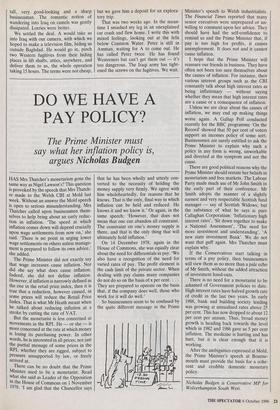DO WE HAVE A PAY POLICY?
The Prime Minister must say what her inflation policy is,
argues Nicholas Budgen HAS Mrs Thatcher's monetarism gone the same way as Nigel Lawson's? This question is provoked by the speech that Mrs Thatch- er made to the Welsh CBI at Mold last week. Without an answer the Mold speech is open to serious misunderstanding. Mrs Thatcher called upon businessmen them- selves to help bring about an early reduc- tion in inflation. 'The speed at which inflation comes down will depend crucially upon wage settlements from now on,' she said. 'There is no point in urging lower wage settlements on others unless manage- ment is prepared to follow its own advice,' she added.
The Prime Minister did not exactly say that wage increases cause inflation. Nor did she say what does cause inflation. Indeed, she did not define inflation. However, if inflation is narrowly defined as the rise in the retail price index, then it is true that a reduction, however caused, in some prices will reduce the Retail Price Index. That is what Mr Heath meant when he talked about reducing inflation at a stroke by cutting the rate of VAT. But the monetarist is less concerned at movements in the RPI. He — or she — is more concerned at the rate at which money is losing its purchasing power. In other words, he is interested in all prices; not just the partial message of some prices in the RPI, whether they are rigged, subject to pressure unsupported by law, or freely arrived at.
There can be no doubt that the Prime Minister used to be a monetarist. Read What she said as Leader of the Opposition in the House of Commons on 1 November 1978. 'I am glad that the Chancellor says that he has been wholly and utterly con- verted to the necessity of holding the money supply very firmly. We agree with him wholeheartedly, for reasons that he knows. That is the only, final way in which inflation can be held and reduced. He knows it and we know it.' Or again, in the same speech: 'However, that does not mean that one can abandon all constraint. The constraint on one's money supply is there, and that is the only thing that will ultimately hold inflation.'
On 14 December 1978, again in the House of Commons, she was equally clear about the need for differentials in pay. 'We also have a recognition of the need for varied rates of pay. The profit element is the cash limit of the private sector. When dealing with pay claims many companies do not do so on the basis of x per cent. . . . They are prepared to operate on the basis that, if the company does well, those who work for it will do well.'
So businessmen seem to be confused by the quite different message in the Prime Minister's speech to Welsh industrialists. The Financial Times reported that many senior executives were unprepared or un- willing to comment upon her advice. They should have had the self-confidence to remind us and the Prime Minister that, if pay is too high for profits, it causes unemployment. It does not and it cannot cause inflation.
I hope that the Prime Minister will reassure our friends in business. They have often not been too sure themselves about the causes of inflation. For instance, their various interest groups such as the CBI constantly talk about high interest rates as being inflationary — without saying whether they mean that high interest rates are a cause or a consequence of inflation.
Unless we are clear about the causes of inflation, we may end up making things worse again. A Gallup Poll conducted recently for the BBC programme 'On the Record' showed that 50 per cent of voters support an incomes policy of some sort.
Businessmen are surely entitled to ask the Prime Minister to explain why such a policy in any form is wrong, unworkable and directed at the symptom and not the cause.
There are good political reasons why the Prime Minister should restate her beliefs in monetarism and free markets. The Labour Party made much use of Mr John Smith in the early part of their conference. Mr Smith adopts the manner of a slightly earnest and very respectable Scottish fund manager — say of Scottish Widows; but the substance of what he says is pure Callaghan Corporatism: 'Inflationary high interest rates', 'Sit down together to make a National Assessment', 'The need for more investment and understanding', 'A new state investment Bank'. We do not want that guff again. Mrs Thatcher must explain why.
If the Conservatives start talking in terms of a pay policy, then businessmen will view them as no more than a pale echo of Mr Smith, without the added attraction of investment hand-outs.
There is no need for a monetarist to be ashamed of Government policies to date.
High interest rates have halved growth rate of credit in the last two years. In early 1988, bank and building society lending was growing at annualised rates above 25 per cent. This has now dropped to about 12 per cent per annum. Thus, broad money growth is heading back towards the level which in 1982 and 1986 gave us 5 per cent inflation. The medicine is hurting and has hurt, but it is clear enough that it is working.
After the ambiguities expressed at Mold, the Prime Minister's speech at Bourne- mouth must provide the basis for a cohe- rent and credible domestic monetary policy.
Nicholas Budge?? is Conservative MP for Wolverhampton South West.


















































 Previous page
Previous page